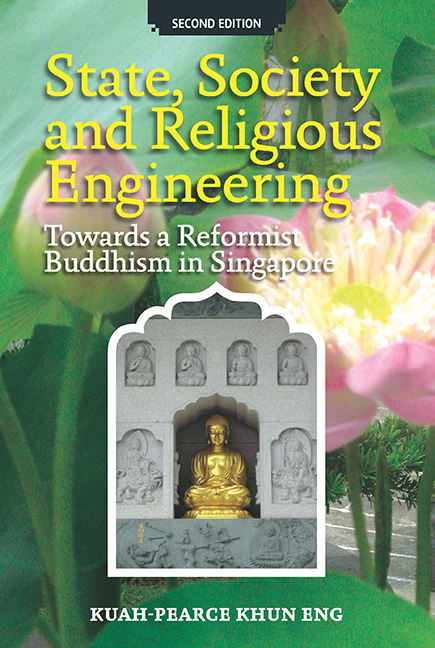Book contents
- Frontmatter
- Contents
- List of Diagrams
- Note on Romanisation
- Preface to the Second Edition
- Acknowledgements to the Second Edition
- Introduction
- PART 1 INVENTING A RELIGIOUS TRADITION
- PART 2 STATE, SOCIETY AND RELIGIOUS ENGINEERING
- PART 3 TOWARDS A REFORMIST BUDDHISM
- Conclusion
- Postscript to the Second Edition: Towards a Humanist and Socially-engaged Buddhism
- Glossary
- Bibliography
- Index
- Frontmatter
- Contents
- List of Diagrams
- Note on Romanisation
- Preface to the Second Edition
- Acknowledgements to the Second Edition
- Introduction
- PART 1 INVENTING A RELIGIOUS TRADITION
- PART 2 STATE, SOCIETY AND RELIGIOUS ENGINEERING
- PART 3 TOWARDS A REFORMIST BUDDHISM
- Conclusion
- Postscript to the Second Edition: Towards a Humanist and Socially-engaged Buddhism
- Glossary
- Bibliography
- Index
Summary
Religion plays an important role in the process of modernisation and social change in contemporary societies. Likewise, a changing socio-economic and socio-political environment has forced existing religions to change and cater to the modern needs of the people, the society and the state. This is particularly the case in a postmodernist era with the rise of religious movements and a revival in the various world religions such as Islam, Christianity, Buddhism and Hinduism.
RELIGIOUS CHANGE AND MODERNISATION
This book explores religious modernisation and change within the Singapore Chinese society. It will focus on how Chinese religious syncretism – Shenism – is being forced to change and adapt to the modern needs of society and state. It will examine the process of “Buddhicisation” of the Chinese religious syncretism and a movement towards Reformist Buddhism within the Chinese community where 65% of the Buddhists now regard themselves as Reformist Buddhists. In this process of religious modernisation and change, the agents responsible for transforming the religious landscape of the Singapore Chinese include the Singapore state, the Buddhist Sangha and the Reformist Buddhists within the Chinese community. On top of this, the Christians, particularly Christian fundamentalists, with their aggressive proselytisation and rapid conversion rate, serve as a catalyst to hasten religious change within the Chinese community.
In searching for an answer to understand the relationship between religious change and modernisation in Singapore, it is imperative for us to explore the process of modernisation. Early debates on modernisation focus on the role of colonialism, the emergence of a group of Western-trained modern elites and the acquisition of Western skills in bringing about political, social and economic changes in a country. Modernisation is often equated with Westernisation, and this modernising path continues to be taken for granted in many parts of Asia today (Lerner, 1958; Apter, 1965; and Alter, 1989). Among the politicians in Singapore, modernisation continues to be equated with Westernisation in the immediate years of independence up till the 1980s. Since the late 1980s, with the then Prime Minister, Lee Kuan Yew, at the forefront, there has been a push among the Asian countries for the Asian brand of modernisation culminating in the “Great Debates on Asian Values”.
On the academic front, a group of scholars gathered to discuss the issue of “multiple modernities” in an attempt to understand the various paths of modernisation embarked upon by different countries in the world today.
- Type
- Chapter
- Information
- State, Society and Religious EngineeringTowards a Reformist Buddhism in Singapore (Second Edition), pp. 1 - 18Publisher: ISEAS–Yusof Ishak InstitutePrint publication year: 2009



